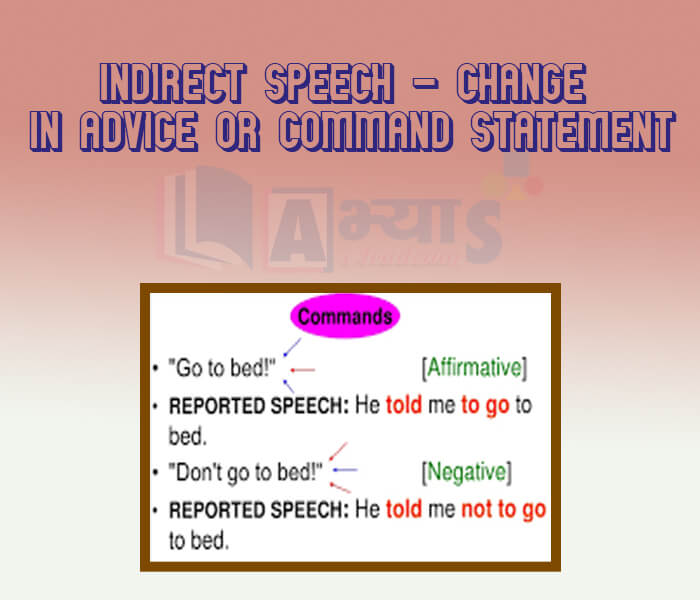Indirect Speech - Change in Advice or Command Statement









Indirect Speech - Change in Advice or Command Statement
Change in Advise or Command Statement:
In command and request statements the imperative verb of the direct command (which is the same as the bare infinitive) is changed to a to-infinitive in the indirect command. We use words expressing command or request such as ordered, commanded, shouted, demanded etc. You also often change the saying verb to tell:
The verb tell needs an object, and this is sometimes given in the direct command:
Changing Narration : Imperatives : - Sentences expressing command, order, advice, request etc, are usually called imperative sentences. Imperative sentences have two characteristics :
Rules for Changing Imperative Sentences into Indirect Speech : -
Look at the following examples :
He requested Ramu to bring his papers. (conjunction - 'to') Indirect
2. She said to me, "Have a glass of juice". Direct
She asked me to have a glass of juice. Indirect
3. Ram said to Sita, " Take medicines properly." Direct
Ram advised Sita to take medicines properly. Indirect
4. She said to me, "Don't pluck the flowers." Direct
She warned not to pluck the flowers Indirect
Students / Parents Reviews [10]
Abhyas Methodology is very good. It is based on according to student and each child manages accordingly to its properly. Methodology has improved the abilities of students to shine them in future.

Manish Kumar
10thAbout Abhyas metholodology the teachers are very nice and hardworking toward students.The Centre Head Mrs Anu Sethi is also a brilliant teacher.Abhyas has taught me how to overcome problems and has always taken my doubts and suppoeted me.

Shreya Shrivastava
8thIt was a good experience with Abhyas Academy. I even faced problems in starting but slowly and steadily overcomed. Especially reasoning classes helped me a lot.

Cheshta
10thIt has a great methodology. Students here can get analysis to their test quickly.We can learn easily through PPTs and the testing methods are good. We know that where we have to practice

Barkha Arora
10thI have spent a wonderful time in Abhyas academy. It has made my reasoning more apt, English more stronger and Maths an interesting subject for me. It has given me a habbit of self studying

Yatharthi Sharma
10thBeing a parent, I saw my daughter improvement in her studies by seeing a good result in all day to day compititive exam TMO, NSO, IEO etc and as well as studies. I have got a fruitful result from my daughter.

Prisha Gupta
8thMy experience with Abhyas academy is very good. I did not think that my every subject coming here will be so strong. The main thing is that the online tests had made me learn here more things.

Hiya Gupta
8thIt was good as the experience because as we had come here we had been improved in a such envirnment created here.Extra is taught which is beneficial for future.

Eshan Arora
8thMy experience with Abhyas is very good. I have learnt many things here like vedic maths and reasoning also. Teachers here first take our doubts and then there are assignments to verify our weak points.

Shivam Rana
7thMy experience was very good with Abhyas academy. I am studying here from 6th class and I am satisfied by its results in my life. I improved a lot here ahead of school syllabus.
